My Favorite Mistake: Learning Without Blame in Business and Leadership
My Favorite Mistake is a podcast about learning without blame in business and leadership.
Despite the name, it’s not just my favorite mistake—it’s yours, it’s ours, and it’s what we can all learn from when things don’t go as planned.
Hosted by author and consultant Mark Graban, each episode features honest conversations with leaders, executives, entrepreneurs, and changemakers about a meaningful mistake they made—and what they learned after things went wrong. How they responded. How they improved. How they grew as leaders.
This isn’t a show about failure theater, gotcha moments, or simplistic “lessons learned.” It’s about how real people reflect, improve, and lead better in complex organizations—without scapegoating, shame, or hindsight bias.
What You’ll Hear
• Leadership and management mistakes that reshaped careers, teams, and organizations
• How teams and leaders learn without blaming individuals
• Insights about culture, systems, decision-making, and psychological safety
• Practical lessons drawn from real experience, not abstract theory
Guests come from business, healthcare, technology, sports, entertainment, government, and academia, sharing stories that reveal how learning actually happens.
The Perspective
Mark brings a systems-thinking lens grounded in Lean management, continuous improvement, and psychological safety. The focus is less on who messed up and more on what the system taught us.
Who This Podcast Is For
• Leaders and managers who want to learn from mistakes without blame
• Executives working to build healthier, more resilient cultures
• Professionals who believe improvement starts with reflection, not punishment
My Favorite Mistake: Learning Without Blame in Business and Leadership
My Favorite Mistake is a podcast about learning without blame in business and leadership.
Despite the name, it’s not just my favorite mistake—it’s yours, it’s ours, and it’s what we can all learn from when things don’t go as planned.
Hosted by author and consultant Mark Graban, each episode features honest conversations with leaders, executives, entrepreneurs, and changemakers about a meaningful mistake they made—and what they learned after things went wrong. How they responded. How they improved. How they grew as leaders.
This isn’t a show about failure theater, gotcha moments, or simplistic “lessons learned.” It’s about how real people reflect, improve, and lead better in complex organizations—without scapegoating, shame, or hindsight bias.
What You’ll Hear
• Leadership and management mistakes that reshaped careers, teams, and organizations
• How teams and leaders learn without blaming individuals
• Insights about culture, systems, decision-making, and psychological safety
• Practical lessons drawn from real experience, not abstract theory
Guests come from business, healthcare, technology, sports, entertainment, government, and academia, sharing stories that reveal how learning actually happens.
The Perspective
Mark brings a systems-thinking lens grounded in Lean management, continuous improvement, and psychological safety. The focus is less on who messed up and more on what the system taught us.
Who This Podcast Is For
• Leaders and managers who want to learn from mistakes without blame
• Executives working to build healthier, more resilient cultures
• Professionals who believe improvement starts with reflection, not punishment
My Favorite Mistake: Learning Without Blame in Business and Leadership
Episodes
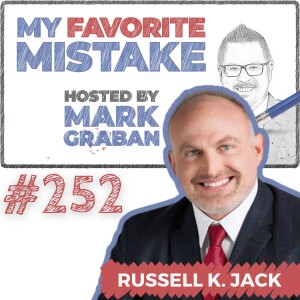
Monday Apr 01, 2024
Russell Jack on a Law Enforcement Mistake and the MAGA Movement
Monday Apr 01, 2024
Monday Apr 01, 2024
Episode page with video, transcript, and more
My guest for Episode #252 of the My Favorite Mistake podcast is Russell K. Jack. He’s a retired US Senior Federal Air Marshal, working in that role from 2002 to 2022. Russell previously served five years as a Federal Police Officer. And previously served five years in the Colorado Army National Guard and was deployed in Saudi Arabia (Desert Storm).
He is also a first-time author — his book is titled, Is MAGA a Terrorist Movement?— available now. He hopes this book will promote critical thinking about protecting our democracy and just how precariously close we are to losing it forever. He writes this book out of a sense of duty to the American people.
In today's episode, Russell shares his favorite mistake story from his time working as a security officer for a major health system. Why did a Black man think he was being racially profiled by Russell? And what did Russell learn about that interaction?
We also dive into important topics from his book — the lessons learned and the implications for 2024 and beyond.
Questions and Topics:
Did you get to share that lesson with others in law enforcement?
How often do you think racial profiling does occur?
What’s the definition of “terrorist”?
Death threats are an example of terrorism?
Fascist? What does that mean and what’s the implication if MAGA wins in 2024?
It’s a mistake that we don’t have a clear definition of “Insurrectionist”?
Who is the audience for the book? The already convinced, or the convincible?? Your hope for the book?
You write you’ve never convinced anybody to stop being MAGA. Do you expect this book to help?
Do you run across people who now think it was a mistake to previously support or vote for Trump?
Does MAGA think they made mistakes in early 2021 that they wouldn’t make again in early 2029??
If Trump were to die tomorrow, what happens to MAGA movement?
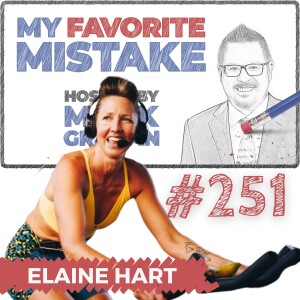
Monday Mar 25, 2024
Monday Mar 25, 2024
My guest for Episode #251 of the My Favorite Mistake podcast is Elaine Hart, the Chief Banana Officer at Power Fitness Events. She’s a resilient fitness enthusiast and former luxury event manager at Rolls-Royce Motor Cars.
Episode page with video, transcript, and more
Overcoming challenges including anorexia, she discovered strength in fitness and community. Elaine transitioned her career to empower others through spinning, founding Power Fitness.
Her resilience was further highlighted during the COVID-19 pandemic, adapting her business to offer virtual classes. With a mantra of “Keep Pedaling,” Elaine's story inspires physical and mental strength, shared passionately from her spinning bike.
In today's episode, Elaine talks about mistakes including:
Quitting her job to start a business in 2020
Feeling shame about her anorexia
Through innovation and determination, Elaine transformed the unforeseen challenges of the COVID-19 pandemic into an opportunity for growth and deepened engagement. Her unique initiative, “Bring Your Own Banana” (BYOB), nurtures an environment of playfulness, motivation, and connectivity within her community. As the ‘Chief Banana Officer,' her story encapsulates the spirit of Power Fitness Events—a testament to the power of resilience, innovation, and community connection.
Questions and Topics:
Why are you the “Chief Banana Officer?”
Would it have been a mistake to stay in the career?
What drove you to make that big decision?
It says Self-Care on the banana – tell us about that
A mistake to think one-size-fits-all when it comes to advice?
Why do you say we should make the stumble part of the dance?
What does it mean to distance yourself from the action, the mistake?
Shame around mistakes — had a lot of shame around her anorexia?
Mental health first aid??
The importance of being playful? How did you learn this or discover it in you?
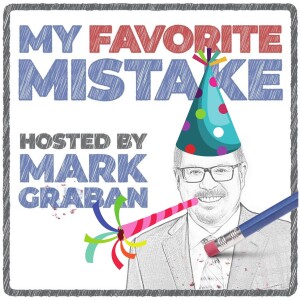
Monday Mar 18, 2024
250 Episodes! Celebrating and Reflecting on a Podcasting Journey
Monday Mar 18, 2024
Monday Mar 18, 2024
In this special bonus episode, Mark Graban reflects on 250 conversations about failure, learning, and growth on the My Favorite Mistake podcast—sharing behind-the-scenes lessons, favorite moments, and what these stories reveal about leadership, humility, and learning from mistakes.
Kevin Harrington episode
Mark Teich episode
Rep. Will Hurd episode
Rep. Adam Smith episode
Sofie Roux episode
Tom Peters episode
Video of Karyn Ross and her suitcase
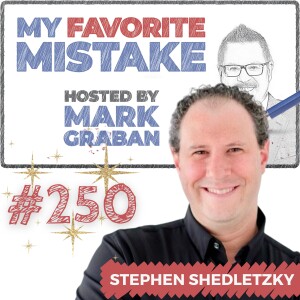
Monday Feb 26, 2024
How Speak-Up Culture Builds on Psychological Safety | Stephen Shedletzky
Monday Feb 26, 2024
Monday Feb 26, 2024
My guest for Episode #250 (!!!) of the My Favorite Mistake podcast is Stephen Shedletzky or “Shed” to his friends. He is a sought-after speaker, coach, and advisor, — As a thought leader on psychological safety in the workplace, Shed has led hundreds of keynote presentations, workshops, and leadership development programs around the world.
Episode page
Author of the book Speak-Up Culture: When Leaders Truly Listen, People Step Up.
After years on a corporate track, Shed was introduced to and inspired by the work of best-selling author Simon Sinek and, became the fourth person to join his team. For more than a decade, Shed contributed at Simon Sinek, where he led a global team of speakers and facilitators.
Shed graduated from the Richard Ivey School of Business with a focus on leadership, communication, and strategy. He received his coaching certification from The Co-Active Training Institute. He lives in Toronto with his wife and two young children.
Shed's route from his first job post-business school to establishing himself as a speaker, coach, and thought leader reflects the transformative power of self-awareness and the pursuit of work that aligns with personal passions. He transitioned from a potentially constrained corporate environment to one where he could significantly impact organizational cultures on a global scale.
While navigating shifts in career paths can be intimidating, especially during disruptions like layoffs, such moments can provide much-needed clarity and drive individuals to seek opportunities that resonate more with their personal values and dreams. Shed's experiences prove that embracing change and following your passion can lead to a fulfilling career, inspiring others to contemplate and pursue their professional aspirations in a more authentic, dedicated, and inspired manner.
Adopting psychological safety, authentic leadership, and the courage to speak up is critical to nurturing a positive and productive workplace culture. Steven Shedletzky's life and insights stand as an inspiration for all personnel, helping them create environments that prioritize the well-being of their teams and promote purposeful and fulfilling work.
Questions and Topics:
Should we quit or stick it out??
What is a speak-up culture? Why a speak-up culture?
Lessons about HOW to speak up most effectively?
Maybe we should call it ‘listen up culture’?
How often are leaders in denial about this culture problem? Or how often do they put the onus on employees that they SHOULD speak up?
Elon Musk seems not to engender a speak-up culture…
Boeing has declared now they want employees to speak up
What must leaders do to cultivate a “speak up” culture?
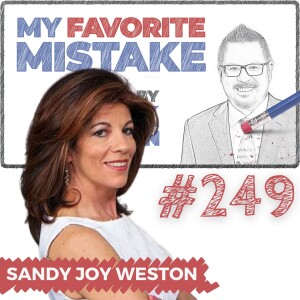
Monday Feb 19, 2024
Monday Feb 19, 2024
My guest for Episode #249 of the My Favorite Mistake podcast is Sandy Joy Weston M.Ed. She is a keynote speaker, international podcaster, three times published author, and entrepreneur, who has owned and operated health and wellness companies over the past 30 years.
Episode page
Early in her career, she became the first female trainer for the Philadelphia Flyers and spent many years as a media personality and as Philadelphia NBC10's Fitness Expert. She created the nationally recognized Philly Street Line Dance to help combat Philly’s “fattest city” label.
For the past five years, Sandy has been focusing on SJW Productions, an international company whose main mission is to highlight all the positive in the world. She does this through her international podcasts, her books, Train Your Head & Your Body Will Follow, My 30-Day Reset Journal and her programs and workshops. Sandy’s mission is to spread pure joy and inspire others to see their true power.
She’s also the host of her podcast, “Let’s Keep it Real,” and I'll be a guest there soon.
Sandy took her passion for fitness to a whole new level in 1993 by launching her club, Weston Fitness. Her fitness club was not just another establishment; it was designed to be cutting-edge and cater to fitness trends with unique classes like spin. Weston's focus was on the transformative power of fitness, where she aimed to offer not just exercise but entertainment and community building within her club’s walls.
In her approach to wellness, Sandy Weston didn’t shy away from ground-breaking methods to create a sense of community. Her innovation in this area can be seen in the introduction of the controversial but beloved “porno spin.” It was these kinds of decisions that marked Weston Fitness as more than a gym. Weston’s Club was, and still is, a space where camaraderie and joy are intertwined with health and physical fitness – a testament to Weston’s vision and innovation in the wellness industry.
And we'll hear Sandy's “favorite mistake” stories!
Questions and Topics:
What was it like being the FIRST female trainer for the Flyers?
Was there any controversy about starting with the Flyers?
What was it like working on TV — fear of mistakes in that work? How did you get into that?
You rarely say “mistake” or “failure” — why?
We’re all busy and have goals… making time can be tough.
Move for a minute – baby steps
Mark's podcasts with Robert Maurer
“What keeps you up at night?”
Language matters —“Dumb mistake”??
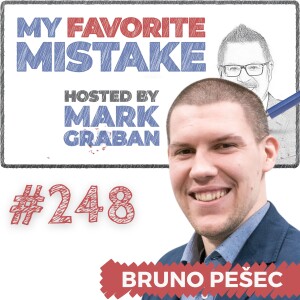
Monday Feb 12, 2024
Building a Prototype the Customer Didn’t Believe: Bruno Pešec
Monday Feb 12, 2024
Monday Feb 12, 2024
My guest for Episode #248 of the My Favorite Mistake podcast is Bruno Pešec, A Croatian living in Norway.
Episode page with video, transcript, and more
Bruno Pešec helps business leaders innovate profitably. He is the rare innovator who can claim he's worked on a regulation-defying freight train and an award-winning board game. In addition to his corporate experience with brands like DNV, DNB, and Kongsberg Group, Bruno runs a community of entrepreneurs of several thousand members. He is currently undertaking a doctorate in organizational change, with a specific focus on the issues with innovation in large enterprises. Bruno has co-authored the Augmented Strategy book, a practical guide to decision-making based on data and human intuition.
His academic credentials include a master's degree with distinction in industrial engineering and management, specialization in production and quality engineering, and an advanced management diploma specializing in strategy and innovation.
He has also been trained by Toyota in corporate value creation and innovation. Bruno is currently undertaking a doctorate in organizational change, with a peculiar focus on the issues with innovation in large enterprises.
In today's episode, Bruno shares his favorite mistake story about a revolutionary freight train design that seemed to deliver against impossible customer requirements — but it seemed too good to be true! We also discuss how Bruno moved past his initial skepticism about the “Lean Startup” methodology to be a big advocate for the approach. We also discuss his educational board game, “Playing Lean” and mistakes he learned from during that journey.
Questions and Topics:
Was it a mistake to ignore Lean Startup initially 2008 before starting to pay attention in 2012?
Like me, you’re an Industrial Engineer – with Toyota Production System origins… what did you experience and learn through Toyota?
“Playing Lean” and “Playing Lean 2”
Were you able to talk with any non-buyers to get feedback??
Not just experimenting on the product, but also on the business model?
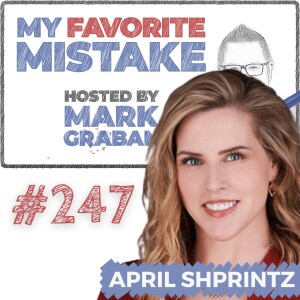
Monday Feb 05, 2024
Driving Growth Through the Generosity Culture — April Shprintz
Monday Feb 05, 2024
Monday Feb 05, 2024
My guest for Episode #247 of the My Favorite Mistake podcast is April Shprintz, owner of her firm, Driven Outcomes. She’s is a leading sales expert and business accelerator, having generated over $1.2 billion in direct revenue in different roles.
Episode page with video, transcript, and more
She is also the creator of The Generosity Culture® and the host of the top-rated podcast, “Winning Mindset Mastery.” April's book, Magic Blue Rocks: The Secret to Doing Anything, is available as an audiobook, Kindle, and paperback.
Named one of the Top 22 Entrepreneurs of 2023 by New York Weekly, April is a U.S. Air Force veteran and has been described as a force of nature.
Shprintz's journey is a masterclass in defying norms and embracing opportunities. Her transition from military to civilian life, her progression from broadcasting to sales, her courage to challenge hiring status quos—each of these phases in her career path are instructive and inspiring. In this episode, she shares her insights on leadership, her revolutionary ideas about workplace culture, and the lessons she's learned from her favorite mistakes.
Questions and Topics:
What if you hadn’t sent the email?
Did you adjust after being hired?
Your company — “Driven Outcomes” — why that name?
Why do you share your series of FAIL Friday posts on LinkedIn?
Sounded authoritative — good trait for a newscaster? A consultant? Executive? Is there training for that?
Building rapport by sharing mistakes? What have you learned?
Transferrable Leadership lessons from your time in the Air Force?
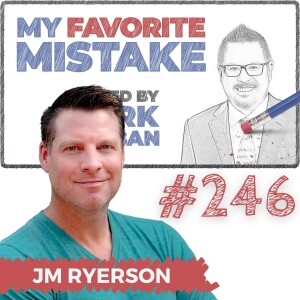
Monday Jan 29, 2024
Learning from Leadership Mistakes with JM Ryerson
Monday Jan 29, 2024
Monday Jan 29, 2024
My guest for Episode #246 of the My Favorite Mistake podcast is JM Ryerson, co-founder and CEO of Let's Go Win. He's an author, leadership & performance coach, international speaker, and host of the Let’s Go Win podcast.
Episode page with video, transcript, and more
JM Ryerson founded and sold three businesses and is now helping leadership teams do the same. He’s the Best Selling Author of the books “Let's Go Win,” “Champion's Daily Playbook,” and his latest, “Upgrade.” JM has been building companies and leading sales teams for over 20 years. He is the co-founder and CEO of Let's Go Win whose mission is to increase leadership, enhance culture, and help teams achieve peak performance.
In this episode, Ryerson recounts his initial ventures in the financial world, not as a numbers guru, but as a skilled salesman with the innate ability to motivate teams. He discusses his mindset switch from traditional roles to leading and expanding businesses, driven by a passion for nurturing growth and creating value for all involved.
He delves into how he navigated setbacks, transforming them into life-changing growth opportunities, and the importance of maintaining a positive mindset amidst adversity. Highlighting his journey, Ryerson guides us through how he discovered his true calling of motivating teams, which ultimately brought unparalleled fulfillment and success.
Questions and Topics:
First to get to know you a little better — what were those three businesses?
What’s your favorite mistake?
Did you have a coach or did you coach yourself out of it?
Mistake to be in financial businesses? To stay there?
How to help others bounce back — remembering your WHY, connecting it back to your why
Giannis Antetokounmpo: “It's not a failure. It's steps to success.”
Coaching leaders — when to let the setback go… and to look forward
Talk about your leadership coaching – helping people process and work through mistakes
What are the fastest changes facing the leaders you coach?
3 focus areas: Performance, leadership, and mindset — Which mindsets most often need upgrading?
How to upgrade mindsets? To not get stuck in a mindset
Carol Dweck – Mindset
Mark was a guest on the “Let's Go Win” podcast
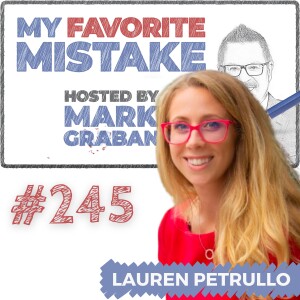
Sunday Jan 21, 2024
Learning from Marketing Mistakes with Lauren Petrullo (Mongoose Media)
Sunday Jan 21, 2024
Sunday Jan 21, 2024
My guest for Episode #245 of the My Favorite Mistake podcast is Lauren Petrullo. She is an award-winning marketing expert, digital marketing and eCommerce consultant, and successful multi-founder. Lauren has overcome great adversity from a young age, as well as living by the F.A.I.L. method with her Mongoose Media “pack mates” as she calls them.
Episode page with transcript, video, and more
Lauren is the CEO and Founder of Award Winning Marketing Agency, Mongoose Media, Founder of boutique eCommerce store Asian Beauty Essentials, Chief Marketing Officer of eco-conscious baby swimwear Beau & Belle Littles, and co-founder of chatbot service Bot Blondes. As a former Innovation Producer at The Walt Disney Company, Lauren incorporates her background in innovation and design to infuse creativity and play into all of her marketing strategies.
Today, we're talking about turning failures into stepping stones. In this episode, Lauren will dig into her “fail method,” the importance of integrating creativity into marketing strategies, and her unique approach to fostering a culture of transparency and learning at Mongoose Media.
Further, she will delve into the value of diversity in honing effective marketing strategies and the proactive approach toward addressing and learning from mistakes. Also, discover how Lauren and her team are leveraging innovative remote collaboration tools and setting an example of how to emulate a robust and dynamic work culture.
Questions and Topics:
Why the name Mongoose Media?
Why “pack mates”?
Why is it important to tell your team about your mistake?
Having a F.A.I.L. channel on Slack
Celebrating failure? “First Attempt in Learning”?
Celebrating the Biggest failure of the week?
Hiring selection vs. bringing them along in the culture? Which is more important?
Using small mistakes to prevent big ones?
“Why do I want to celebrate failures??” — good catches
What is “The ONLY Advertising Hospital™?”?
Why do you embrace the title of “destruction queen”?
In your bio it says — “Dare to be vulgar, refuse to be boring.”???
Get a 20% discount code at AsianBeautyEssentials.com when you enter MISTAKES at checkout!
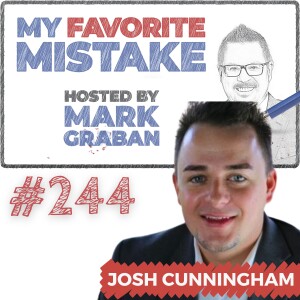
Monday Jan 15, 2024
Monday Jan 15, 2024
My guest for Episode #244 of the My Favorite Mistake podcast is Josh Cunningham, the CEO and Founder of rokrbox – an inside sales assistant company based in College Station, Texas.
Episode page with transcript and more
After starting rokrbox in 2013, Josh’s real estate company has worked over 3,000,000 internet leads for teams all across the country including Lars Hedenborg, Jeff Cohn, & Spring Bengtzen. Having hired and trained over 400 ISAs, Josh is a sought-after speaker for his invaluable knowledge on
He’s focused on developing a company culture that attracts the best millennial talent and drives success.
Josh has learned how to scale and optimize business portfolios through building amazing teams with his take on company culture. His expertise was showcased through rokrbox's award winning culture, which inspired him to become the founder & CEO of Five Star Company Culture.
Host of a podcast by that name — thanks for having me as a guest and thanks for being my guest here today!
Josh's mission is to help businesses maximize their potential and learn how to implement a winning culture that retains employees, increase team productivity, and allows business owners to regain their personal freedom.
Stepping back, Josh explains the wakeup call they faced during an organic period of growth, as their student workforce started to shrink with the onset of school schedules. Instead of panicking, they pivoted, embracing the lesson as an opportunity to refine communication and clarify their mission. Transforming this hitch into a turning point, they instated a daily huddle, which not only served to align team focus, but also sparked a cultural shift by nurturing an environment of support, connectivity, and collective growth.
Questions and Topics:
When did you realize it was YOU that “failed”?
What did they do to fix it?
Tell us more about the huddles – how long? Standard agenda?
What was the effect in fall 2016?
Appealing to millennials vs. Gen Z? Have you had to adjust?
Where did you learn these mindsets and management styles from?
Defining core values and types of people to work with?
What do you do as a CEO that helps make it safe for others to do the same?
Tell us about the “Five Star Company Culture” podcast
My episode with our mutual connection, Kevin Harrington
The Power of a Champion Mindset in Business Culture
Embracing a Culture of Learning from Mistakes
In the competitive landscape of business, a culture that fosters growth and development through learning from missteps is crucial. Rokrbox, an inside sales assistant company, has epitomized this philosophy by embedding the mindset of a champion into their core values. This doesn't imply a streak of unblemished victories; rather, it means recognizing that both wins and lessons emerge from each outcome. A true champion is defined not by a flawless record, but by resilience and the willingness to stand back up after falling down, transforming setbacks into stepping stones for growth.
Overcoming Challenges: Reflecting and Implementing Change
Rokrbox faced a notable challenge during a period of rapid growth. In the summer of 2015, as the company soared to new heights, a significant portion of their part-time workforce, primarily made up of students, dissipated with the start of the fall semester. This unexpected shift presented a stark realization that the meaning and importance of their work weren't being effectively communicated by leadership. It was a crucial moment that shifted the company's focus inward, igniting a reflection on the mechanisms essential for transparent communication and employee retention.
The Magic of Daily Huddles: A Key to Cultural Success
The transformative solution that Rokrbox discovered was the implementation of a daily huddle. A practice that now anchors their workday, these huddles serve as a time for team members to connect, recognize each other's achievements, set collective goals, and align on the mission for the day ahead. This ritual not only eradicated previous communication inefficiencies but also played a pivotal role in shaping the company's award-winning culture. It created an environment where each employee could see the bigger picture, comprehend how their contributions mattered, and envision a path for professional growth within the company. This daily routine of recognition, education, connection, and motivation ensures that all team members feel valued and part of a larger goal.
Creating a Vision and Communicating It Effectively
The lesson here extends far beyond the boundaries of a single company's experience. The leader's role is not only to create a vision but to effectively communicate it throughout the organization. Rokrbox exemplifies that having a clear and vivid vision isn't sufficient unless it is shared and understood by the entire team. Issues in business often stem from communication breakdowns, and a leader's capacity to articulate goals and expectations to their team members is paramount. Through the huddle process, Rokrbox was able to transform communication within the workplace, demonstrating that intentionality and structure in daily interactions could forge more profound employee engagement and drive stronger business outcomes.
The Importance of Core Values in Recognition and Growth
Highlighting the successes and efforts related to core values within the huddle reinforces their importance in the company culture. Rokrbox has shown that core values are not just platitudes; they are the standards by which team achievements are measured and celebrated. Acknowledging team members who live by these values each day keeps them active and exemplifies the behaviors that lead to success.
Concluding Insights: The Role of Leadership in Navigating Mistakes
Ultimately, the story of Rokrbox provides an insightful examination of the role of leadership when navigating through mistakes. Instead of assigning blame externally, it takes a leader to look inward and take responsibility for the team's direction. Identifying gaps in communication and rectifying them through strategic actions, like daily huddles, not only salvages a challenging situation but also propels the business forward with renewed strength and cohesiveness. This approach is a testament to the statement that victories in business are not only about winning but also about learning to rise after setbacks and emerge stronger.
Cultivating Skill Development and Proactive Communication Strategies
Rokrbox's adaptations to their business in response to generational shifts and student workforce dynamics underscore the importance of flexibility and foresight in personnel management. By examining resumes with greater scrutiny and asking more probing questions during interviews, they ensure that employment expectations align with both the company's needs and the students' academic schedules. This targeted approach not only aids in the selection of dedicated team members but also fortifies the retention of valuable talent.
Furthermore, maintaining a proactive dialogue with employees about their outside commitments allows for preemptive scheduling adjustments. This adaptability preserves the employment relationship, preventing abrupt departures and promoting employee well-being.
Implementing Regular One-on-Ones for Holistic Employee Engagement
One significant practice adopted by Rokrbox is the holding of regular one-on-one meetings that follow a strategic cadence of evaluation and engagement. These meetings are structured to review work-related skills and pinpoint areas needing improvement. Importantly, they conclude with inquiries into the personal lives of employees, thus embodying a holistic approach to employee engagement. Recognizing that personal circumstances can heavily impact work performance, this approach fosters an environment of support and understanding within the company.
Leveraging Masterminds to Foster Collective Growth
Taking inspiration from traditional masterminds made popular by thought leaders like Napoleon Hill, Rokrbox has instituted monthly mastermind sessions to cultivate collaborative problem-solving and empower their employees. These sessions, promoted with incentives like free food, encourage voluntary participation from team members eager to discuss strategies for improvement. By facilitating this shared environment, Rokrbox reinforces its commitment to collective growth and allows for the integration of diverse perspectives into the company's operational framework.
Adapting to Generational Differences without Stereotyping
The evolution of Rokrbox workforce from millennials to Generation Z has entailed an understanding of each generation's idiosyncrasies while avoiding overgeneralizations that hinder relationship building. Recognizing that individuals bring unique values and behaviors to the table facilitates a more nuanced approach to team building. Josh Cunningham of Rokrbox also emphasizes the necessity of adapting management techniques, such as content and competition structuring, to match evolving attention spans and engagement styles without succumbing to the pitfalls of confirmation bias.
Implementing Strong Values Across Generations
Ultimately, Rokrbox's approach emphasizes the timeless nature of certain management principles, regardless of generational divides. Strong company values that resonate on a fundamental human level will consistently attract employees who align with the company's mission. The implementation of practices such as huddles and masterminds transcends age brackets, connecting employees to a shared vision of success and growth within the organization.
Learning from External Experiences and Insights
The trajectory of Rokrbox's culture is not merely an introspective journey; it has been informed by various external sources of insight. Josh Cunningham's exposure to .com era influences and his father's career provided the early inspiration for entrepreneurship and adapting to technological paradigms. As the business world continues to evolve, learning from both internal experiences and external wisdom remains a critical component in cultivating a resilient and impactful company culture.
Harnessing the Power of Teamwork in System and Process Design
Reflecting on Rokrbox's adoption of standard operating procedures (SOPs), similar to those which propelled Best Buy's consistent in-store experiences, underscores the critical role of systems and processes in achieving a harmonious business environment. When each team member comprehends their responsibilities and the expected outcomes, efficiency and productivity thrive within the organization. Therefore, it is imperative to recognize the vitality of establishing and continuously refining SOPs to adapt to the inevitable changes within any dynamic market.
Inculcating Ownership and Agility in Small Business Environments
Working with small business owners, as Josh Cunningham did, offers the unique advantage of seeing real-time impacts of one's contributions on company performance. This immediacy catalyzes a sense of ownership and responsibility among employees, encouraging them to step up as key contributors to the organization’s success. To incorporate this level of agility into any business model, companies must imbue their culture with an openness to employee feedback, quick implementation of viable suggestions, and an empowering environment, where actions directly correlate to tangible outcomes.
Learning from the Spectrum of Job Experiences
Every job, from the most menial to the most prestigious, imparts valuable lessons that can transform business practices. Acknowledging even the “crappy jobs” fosters an appreciation for what not to replicate, while simultaneously refining the vision for one’s own business environment. The takeaway for any business is profound: understanding the breadth of employee experiences can inform and inspire better workplace design, improving morale and productivity in kind.
The Significance of Defining Company Values Early On
Defining Rokrbox's core values long before the hiring process began served as a testament to the foresightfulness of its leadership. Clear and resonant values not only attract like-minded individuals to the team but also serve as a constant beacon, guiding decisions and behaviors. As a business grows and evolves, these values remain its pillars, ensuring a consistent and supportive culture that can withstand and adapt to market fluctuations and internal challenges.
Building a Strong Cultural Foundation for Sustainable Growth
Drawing an analogy from construction, every great skyscraper begins with a robust foundation. Rokrbox's philosophy that culture is akin to this foundation illustrates the belief that a company's resilience is deeply anchored in its core values and collective ethos. Amidst marketplace shakeups and economic turns, a steadfast cultural base allows a business to pivot effectively and maintain its core identity, even as services and problem-solving approaches may evolve.
Creating a Coachable Atmosphere and Celebrating Vulnerability
Josh Cunningham’s approach to leadership takes root in serving rather than dictating, encouraging personal empowerment, and fostering a culture wherein mistakes are viewed as opportunities for growth rather than failures. By promoting a coachable atmosphere and leading by example in vulnerability, employees are permitted to navigate their responsibilities with confidence and ownership, contributing to the overall resiliency and strength of the business.
The Five Star Company Culture Initiative
As a leader with a vision to serve beyond his own company, Cunningham’s Five Star Company Culture initiative extends his philosophy to a wider audience, seeking to assist other business owners and C-suite executives in crafting environments where values are lived out loud. By sharing insights and practical strategies, this platform aims to assist businesses in laying down robust foundations for their culture, ensuring their operations are primed for success and sustainability in a relentless and ever-changing market landscape.
Embracing Vulnerability and Authenticity in Leadership
The candid sharing of personal stories and mistakes by influential figures such as Kevin Harrington sets the stage for a new paradigm in leadership. When leaders like Harrington demonstrate vulnerability, they signal to their teams that it's acceptable to make and admit to mistakes. This behavior, in turn, fosters a culture of authenticity and trust within the workplace. When employees see their higher-ups own up to their errors, they are more likely to feel secure in expressing their own challenges and learning from them.
The Impact of Authentic Stories in Building Trust
Fosters Relatability: Sharing personal mistakes makes leaders appear more relatable and human, bridging the gap between management and staff.
Encourages Openness: When leaders are open about their failures, it cultivates an environment where employees are also comfortable sharing their experiences and ideas.
Builds Resilience: Recognizing and learning from errors paves the way for a resilient mindset, where challenges are seen as opportunities for growth.
The Role of Cross-Promotion in Amplifying Influence
Josh Cunningham's Five Star Company Culture initiative heavily relies on the sharing of experiences and resources to enrich other businesses. By engaging in cross-promotion through podcasts and other media outlets, leaders can extend their reach, sharing valuable lessons and knowledge. Engaging with host Mark Graban illustrates how forming strategic connections can enhance visibility and impact across different platforms, benefiting an ever-wider audience.
Strategies for Effective Cross-Promotion
Leverage Platforms: Utilize various channels, including podcasts and social media, to share insights and expand your influence.
Collaborative Ventures: Forge partnerships with industry peers to share resources and co-create content that provides mutual value.
Community Engagement: Actively participate in community discussions and events to bolster your presence and credibility within your field.
The Significance of Accessible Brand Identity
Josh Cunningham's mention of Rokrbox's distinctive spelling highlights the importance of a memorable and searchable brand identity. In a digital age where web presence is crucial, creating a unique brand that stands out in search engine results is vital to attracting and retaining customers. A brand’s accessibility online directly influences its market performance and the ease with which potential clients can find and engage with a company's services.
Key Elements of Crafting an Accessible Brand Identity
Consistency: Establish a consistent look and feel across all platforms to make your brand easily recognizable.
SEO Strategies: Focus on search engine optimization to ensure your brand ranks well in relevant search results.
Distinct Brand Elements: Develop unique aspects of your brand, such as a logo or tagline, that set you apart and make you easily identifiable.
Nurturing Leadership and Cultivating Success
Leaders like Cunningham, who are ready to share their wisdom and experiences openly, play a pivotal role in shaping the future of business culture. By embodying the principles of vulnerability, authenticity, and accessible branding, they pave the way for a new generation of businesses defined by connection, learning, and genuine engagement with both employees and customers. This holistic approach to leadership, culture, and branding stands as a formidable blueprint for success in the ever-evolving business landscape.
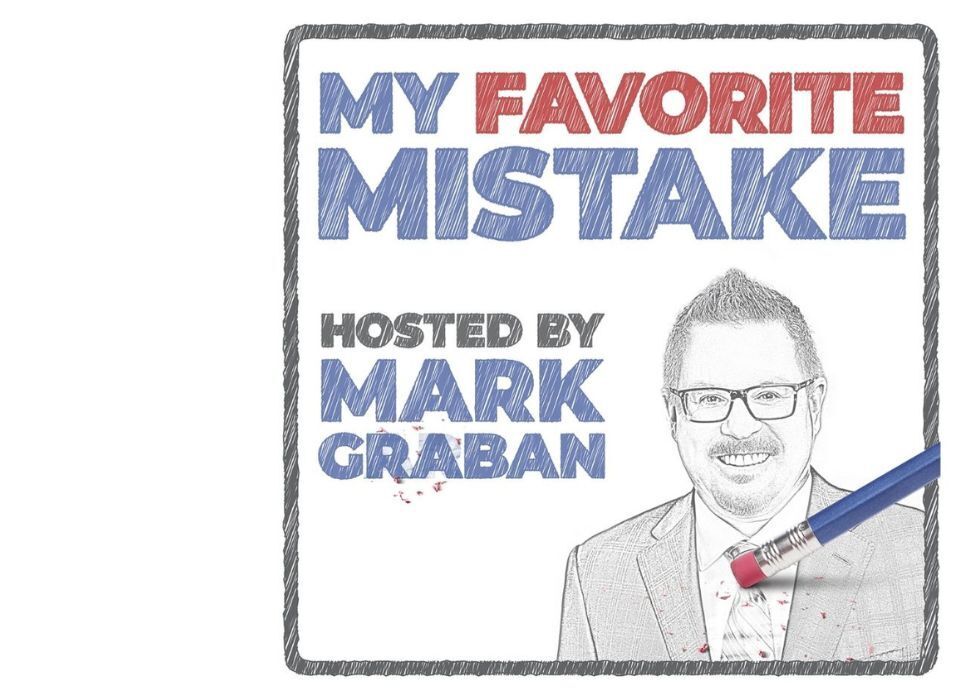
About Mark Graban
Mark Graban is an author, speaker, and consultant, whose latest book, The Mistakes That Make Us: Cultivating a Culture of Learning and Innovation, is available now.
He is also the author of the award-winning book Lean Hospitals: Improving Quality, Patient Safety, and Employee Engagement and others, including Measures of Success: React Less, Lead Better, Improve More.
He serves as a consultant through his company, Constancy, Inc, and is also a Senior Advisor for the technology company KaiNexus.
Mark hosts podcasts, including “Lean Blog Interviews” and “My Favorite Mistake.”
Education: B.S. in Industrial Engineering from Northwestern University; M.S. in Mechanical Engineering, and M.B.A. from the Massachusetts Institute of Technology’s Leaders for Global Operations Program.









